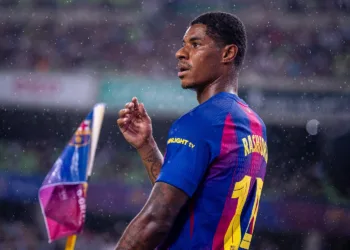The badminton world witnessed a historic moment as India’s Ayush Shetty claimed his maiden BWF World Tour title at the US Open Super 300, marking a triumphant end to India’s title drought in 2025. The 20-year-old’s commanding performance against Canada’s Brian Yang showcased the rising star’s potential and determination on the international stage.
Table of Contents
Shetty’s Stellar Performance Breaks India’s Title Drought
In a masterful display of skill and composure, Ayush Shetty dominated the men’s singles final, defeating the third-seeded Brian Yang 21-18, 21-13 in just 47 minutes. This victory came on the heels of his remarkable comeback win against top seed Chou Tien Chen in the semifinals, proving that India’s most consistent men’s singles player of the year was ready to convert his near-misses into championship gold.

The final began as an evenly contested affair until Shetty seized control at 6-6, extending his lead through brilliant shot placement and tactical awareness. His stunning jump smash winner to secure the first game demonstrated the mental fortitude that separates champions from contenders.
Tanvi Sharma’s Inspiring Journey to the Final
While Shetty celebrated victory, 16-year-old Tanvi Sharma’s journey to her first World Tour final proved equally captivating. The unseeded teenager battled top seed Beiwen Zhang in a thrilling three-game encounter, ultimately falling 11-21, 21-16, 10-21 in 46 minutes.

Despite the loss, Sharma’s performance throughout the week highlighted her tremendous potential for Indian badminton’s future. Her ability to force a decider against the experienced Zhang, who is more than double her age, demonstrated remarkable resilience and skill that bodes well for India’s badminton pipeline.
Match Analysis: Technical Brilliance Meets Mental Strength
Men’s Singles Final Breakdown
The men’s final showcased Shetty’s tactical evolution as a player. After an even start, he gained crucial momentum by winning five consecutive points to lead 11-6 at the first game interval. When Yang mounted a comeback to level at 16-16, Shetty’s response was immediate and decisive, winning crucial points with well-placed shots that demonstrated his growing maturity under pressure.

The second game saw Shetty maintain control throughout, using variations in pace, solid defense, and smart shot selection to prevent Yang from establishing any rhythm. His championship-clinching smash winner epitomized the confidence and flair that marked his breakthrough tournament.
Women’s Singles Final: Experience Versus Potential
Sharma’s final against Zhang presented a fascinating contrast between youthful exuberance and veteran savvy. The teenager’s aggressive start in the second game, building a commanding lead through forced errors and precise shot-making, showed her tactical awareness beyond her years.

The decisive third game revealed the physical demands of professional badminton, as Sharma’s movement and shot accuracy declined against Zhang’s relentless pressure. However, her ability to reach this stage while defeating seasoned opponents throughout the week signals a bright future ahead.
Tournament Statistics and Key Moments
| Match Details | Men’s Singles Final | Women’s Singles Final |
|---|---|---|
| Winner | Ayush Shetty (India) | Beiwen Zhang (USA) |
| Score | 21-18, 21-13 | 21-11, 16-21, 21-10 |
| Duration | 47 minutes | 46 minutes |
| Opponent Seed | 3rd (Brian Yang) | Top seed vs Unseeded |
| Key Moment | Jump smash winner at game point | 31-shot rally in game 2 |
Impact on Indian Badminton
Shetty’s victory represents more than just a personal milestone; it signals India’s continued strength in men’s singles badminton on the international circuit. As India’s most consistent performer in 2025, his breakthrough title validates the country’s investment in developing world-class players.
Sharma’s runner-up finish, meanwhile, adds another promising name to India’s women’s badminton roster. At just 16, her ability to reach a World Tour final suggests that India’s badminton future extends beyond established stars to a new generation of talented players.
Road to Victory: Tournament Highlights
Both Indian players navigated challenging draws to reach their respective finals. Shetty’s semifinal victory over top seed Chou Tien Chen demonstrated his capability to defeat higher-ranked opponents when it matters most. His straight-games victory in the final showed he had learned from previous near-misses to deliver when the stakes were highest.

Sharma’s path proved equally impressive, with the teenager showing remarkable composure throughout the week before ultimately succumbing to the physical demands of her first World Tour final. Her experience gained during this tournament will prove invaluable for future competitions.
Looking Ahead: What This Means for Indian Badminton
These performances at the US Open Super 300 highlight India’s depth in badminton talent across age groups and genders. Shetty’s maiden title provides momentum for upcoming tournaments, while Sharma’s breakthrough final appearance establishes her as a player to watch in women’s badminton.
The contrasting styles and ages of these two finalists demonstrate that Indian badminton is successfully developing players through different pathways, ensuring sustained success on the international stage.
FAQs
What was significant about Ayush Shetty’s BWF World Tour title win?
This was Shetty’s first BWF World Tour title and ended India’s title drought in 2025, marking a breakthrough moment for the 20-year-old who had been India’s most consistent men’s singles player throughout the year.
How did Tanvi Sharma perform in her first World Tour final?
The 16-year-old unseeded player pushed top seed Beiwen Zhang to three games before losing 11-21, 21-16, 10-21, showcasing tremendous potential despite falling short in the final.
What was the key moment in Shetty’s victory over Brian Yang?
Shetty’s stunning jump smash winner to secure game point in the first set demonstrated his mental strength, followed by his ability to maintain control throughout the second game for a straight-games victory.
How long did both finals last?
Both finals were completed in under 50 minutes – Shetty’s men’s final took 47 minutes while Sharma’s women’s final lasted 46 minutes, showcasing the high-intensity nature of both matches.
What does this result mean for the future of Indian badminton?
With Shetty claiming his maiden title at 20 and Sharma reaching her first final at 16, these results highlight India’s strong pipeline of talent across different age groups, promising continued success in international badminton.








